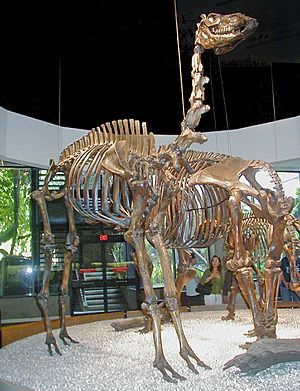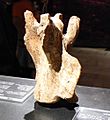Camelops facts for kids
Quick facts for kids Camelops |
|
|---|---|
 |
|
| Mounted skeleton of Camelops hesternus in the George C. Page Museum, Los Angeles | |
| Scientific classification |
|
| Kingdom: | Animalia |
| Phylum: | Chordata |
| Class: | Mammalia |
| Order: | Artiodactyla |
| Family: | Camelidae |
| Tribe: | Camelini |
| Genus: | †Camelops Leidy, 1854 |
| Species | |
|
†Camelops kansanus Leidy, 1854 †Camelops hesternus Leidy, 1873 (type) |
|
Camelops was an extinct type of camel that lived in North America during the Pleistocene epoch. This was a long time ago, from about two million years ago until around 10,000 years ago. Imagine a camel, but living in ancient North America!
These ancient camels were often hunted by large predators of their time. They were prey for animals like wolves, bears, lions, and the famous Smilodon (saber-toothed cat). Camelops disappeared at the end of the last ice age, just like many other large animals of that time.
How Their Environment Changed
Scientists have found clues about where Camelops lived. They studied places like Natural Trap Cave in Wyoming and the Rancho La Brea in Los Angeles. These studies show that Camelops was not like modern camels, which live in deserts. Instead, it lived in woodlands and grasslands with many different kinds of plants.
Before a big climate change about 11,000 years ago, Camelops lived in areas with conifer trees and open spaces near the Montana-Wyoming border. They also lived in coastal shrublands in California. After the climate changed, these woodlands turned into deserts and treeless steppes. This is similar to what much of the western U.S.A. looks like today. Even the types of grass growing there changed.
This change in climate was very important for Camelops. Also, the arrival of humans as hunters might have made things even harder for them. A few Clovis points, which are ancient stone tools used for hunting, have been found at some of the sites where Camelops fossils were discovered.
See also
 In Spanish: Camelops para niños
In Spanish: Camelops para niños
Images for kids
-
A 68,000-year-old C. hesternus skeleton found at the Waco Mammoth National Monument.
 | Aurelia Browder |
 | Nannie Helen Burroughs |
 | Michelle Alexander |




